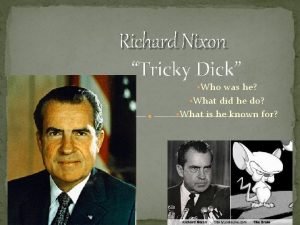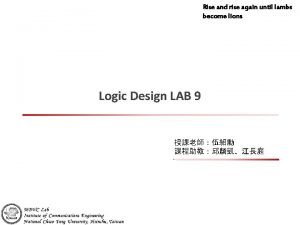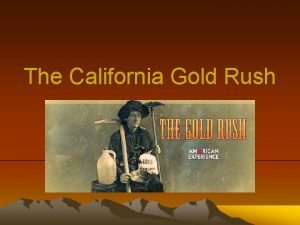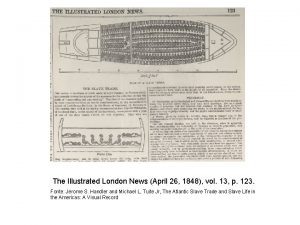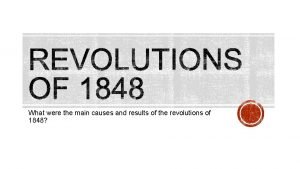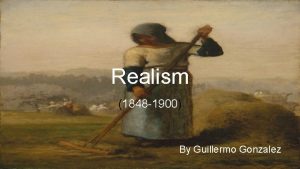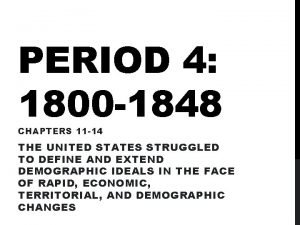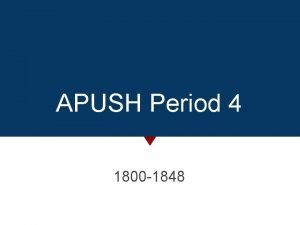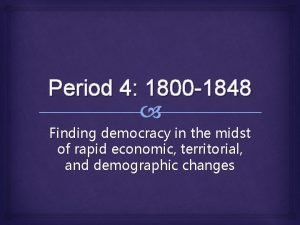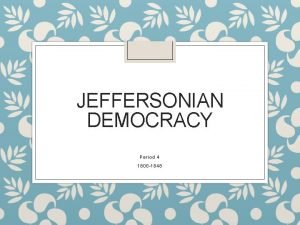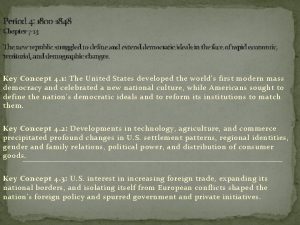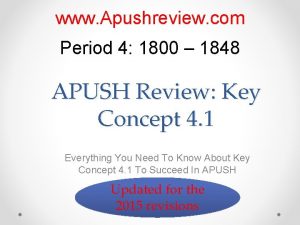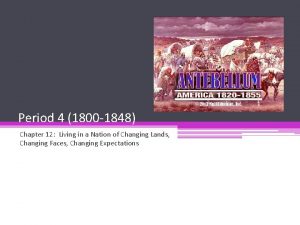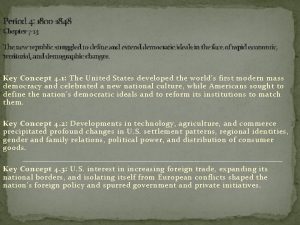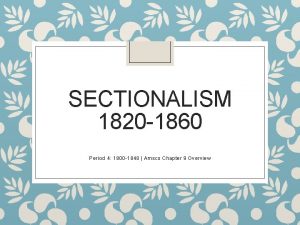Period 4 1800 1848 The Rise of the






















- Slides: 22

Period 4: 1800 -1848 The Rise of the American Republic

Key Concepts 4. 1 The United States developed the worlds first modern mass democracy and celebrated a new national culture, while Americans sought to define the nation's democratic ideals and to reform its institutions to match them 4. 2 developments in technology, agriculture, and commerce precipitated profound changes in the US settlement patterns, regional identities, gender and family relations, political power, and distribution of consumer goods 4. 3 US interest in increasing foreign trade, expanding its national borders, and isolating itself from European conflicts shaped the nation's foreign policy and spurred government and private initiatives.

Hamilton's economic plan promoted manufacturing and enlarged the role of government (Opposition)Jefferson envisioned an agrarian future for the US The Tariff of 1789 Report on Public Credit- US should pay off its debt so it can give loans to new businesses and expand others.

Report on Manufactures- objective of growing and developing manufacturing through: 1. Tariffs, loans and grants for businesses 2. Excise taxes (taxes on certain manufactured goods) to raise revenue to finance the government and it aid business and manufacturing 3. Infrastructural development- aid in the construction of transportation and communication

Creation of a National Bank (the Bank of the United States): national bank would allow the US to give credit to businesses. Government could control reckless speculation by controlling amount of credit given at any one time.

The Bank of the United States and the tariff were opposed in rural areas and southern states Opposed by southern states who believed it was the North that incurred all that debt Loose (necessary and proper) vs strict (original intent of the Framers) interpretation of the Constitution.

Relations with France and Britain were strained under Adams France didn't like the Jay Treaty and believed the Federalists were pro-British XYZ Affair and Quasi-War

There were both differences and similarities between Hamiltonian and Jeffersonian movements • • • Jefferson Represented the common man, the farmer, and therefore democratized the US Anti-capitalistic Favored limitations on the power of the federal government Strict interpretation of the Constitution Future of the nation was agrarian Supported France in foreign policy Hamilton • Represented the interests of the capitalist class • Favored expansion of the federal government • Loose interpretation of the Constitution • Future of the nation was industry • Supported Great Britain in foreign policy

The election of Jefferson is referred to as the "Revolution of 1800" A revolution because of the peaceful transfer of power between two parties with different beliefs. "We Are All Federalists; We Are All Republicans"

THE MARSHALL COURT DEFINED THE ROLE AND POWERS OF THE JUDICIAL BRANCH Madison v. Madison (1803)- established judicial review Fletcher v. Peck (1810)- state could not pass laws that invalidated contracts Martin v. Hunter's Lessee (1816)- supremacy of federal over state courts Dartmouth College v. Woodward (1819)- Reaffirmed Fletcher case Mc. Culloch v. Maryland (1819)- federal government had the implied power to create a national bank Gibbons v. Ogden (1821)- Court recognized federal government's authority over interstate trade Cohen's v. Virginia (1821)- Court asserted the right of the Supreme Court to review the decisions of state supreme courts in issues dealing with the authority of the federal government

TERRITORIAL EXPANSION WAS AN OBJECTIVE OF THE U. S. GOVERNMENT FROM ITS INCEPTION, AS WITNESSED BY THE LOUISIANA PURCHASE, THE REMOVAL OF NATIVE AMERICANS, AND BY THE MEXICAN-AMERICAN WAR Manifest Destiny useful to: 1. Rationalize US foreign policy. Ease guilty consciences at taking someone else's land 2. Create national unity and inspire citizens to rally around the government 3. Counter criticisms raised by other nations

CONTROVERSIAL BRITISH ACTIONS AND AMERICAN POLICIES AGGRAVATED RELATIONS BETWEEN THE TWO NATIONS, LEADING TO THE WAR OF 1812. Britain tried to stop the trade between US and France and passed the following Essex Decision (1805)- British rule that prevented Americans from trading between French colonies and France. (Seized American ships) Leopard-Chesapeake Incident (1807)- American sailors were forced into British navy Orders in Council (1806 and 1807)- Britain blockade on French nations Berlin (1806) and Milan (1807) Decrees- French prevented British from trading with continental Europe.

NEW ENGLAND THE FEDERALISTS STRONGLY OPPOSED THE WAR AND FLOATED THE IDEA OF SUCCESSION New Englanders opposed war for personal and commercial reasons Federalists blamed Jefferson and Madison (both Democratic-Republicans) forcing war against British Some of their actions treasonous: refusing to buy war bonds and aiding the enemy in Canada

VARIOUS GROUPS AND IDEOLOGIES SUPPORTED TERRITORIAL EXPANSION FOR ECONOMIC, POLITICAL, AND CULTURAL REASONS Farmers who sided to become landowners Manufacturers seeking abundant and inexpensive natural resources Investors and industrialists looking to profit off of mining, agriculture, and land speculation These who believed American civilizations were biologically and culturally superior Politicians and military men searching for ways to enhance the nation's political and geographic situation

UNDER THE MONROE DOCTRINE, THE UNITED STATES ESTABLISHED A POLICY OF HEGEMONY, DOMINANCE, IN THE WESTERN HEMISPHERE Told European countries not to colonize in the Western Hemisphere. Why? After the Napoleonic Wars, European countries wanted to restore their monarchies and governments that had been overthrown during the war. America worried Spain might try to establish its empire in S. America again Argument: was the Monroe Doctrine a defensive strategy? Or a way to prevent European colonialism and allow America to colonize in the Western

SOCIAL, ECONOMIC, AND POLITICAL CONDITIONS AND ATTITUDES LED TO THE REFORM SPIRIT IN THE MID-19 TH CENTURY Government and grass roots organizations reformed American society Democratic impulses- address the inequalities in colonial America Antifederalists determined not to sacrifice civil liberties Jeffersonian Democratic-Republicans professed to represent the common American Market Revolution (economic) and Second Great Awakening (social)

AS THE FEDERALIST PARTY FADED, THE "ERA OF GOOD FEELINGS" SET IN. No political strife because there was only one party (1815 -1825) Term suggests that there was social harmony, but slavery still existed

THE SECOND PARTY SYSTEM TOOK SHAPE AS THE NATIONAL REPUBLICANS CHALLENGED THE DEMOCRATS Evolution of Political parties Democratic-Republicans ==> The Democrats Federalists ==> National Republicans ==> Whig Party ==> Republican

GRASSROOTS MOVEMENTS AND GOVERNMENT REFORMS ATTEMPTED TO ADDRESS THE SOCIAL AND ECONOMIC PROBLEMS CONFRONTING THE NATION Women's rights Abolitionist Movement Social Welfare Trade unionism Native American policy Education reform Utopian societies Mental health Temperance movement Prison reform Anti-immigration movement

THE INTELLECTUAL ROOTS OF REFORM SHAPED PERCEPTIONS OF THE INDIVIDUAL'S ROLE IN SOCIETY "What is man born for but to be a reformer, a remake of what man has made? "--Henry David Thoreau and Ralph Waldo Emerson Second Great Awakening- preached that through good works and deeds, individuals could find salvation for themselves and their nation! Immanuel Kant, Critique of Pure Reason, raised doubts about the power of reason Second Great Awakening, transcendentalism, and romanticism asked individuals to get in touch with their own emotions rather than their sense of reason. (Example: while individuals used reasonable economic and social justification for slavery, using emotion you can conclude that slavery was barbaric)

THIS PERIOD WITNESSED IMPORTANT ECONOMIC AND POLITICAL REFORMS, BUT WOMEN, BLACKS, AND NATIVE AMERICANS REMAINED SUBORDINATED Women turned to grassroots movements to get away from the home

Thank You! Any Questions?
 Tricky dick: the rise and fall and rise of richard m. nixon
Tricky dick: the rise and fall and rise of richard m. nixon Little lambs academy
Little lambs academy Rise and rise again until lambs become lions origin
Rise and rise again until lambs become lions origin Sheep become lions
Sheep become lions Quadrilatero austriaco
Quadrilatero austriaco Leto 1848 leto revolucij
Leto 1848 leto revolucij Why did the 1848 revolutions fail
Why did the 1848 revolutions fail Why did the italian revolution of 1848 fail
Why did the italian revolution of 1848 fail Julska monarhija
Julska monarhija January 24th 1848
January 24th 1848 Norddeutscher bund
Norddeutscher bund Leto 1848 in slovenci
Leto 1848 in slovenci 1848 revolution germany
1848 revolution germany Bernhard bolzano
Bernhard bolzano Francúzska revolúcia 1848
Francúzska revolúcia 1848 Revolucije u europi 1848
Revolucije u europi 1848 Illustrated london news 1848
Illustrated london news 1848 Leto 1848 in slovenci
Leto 1848 in slovenci Anul 1848 in europa
Anul 1848 in europa Slidetodoc.com
Slidetodoc.com Vynález mikrofonu umožnil konstrukci
Vynález mikrofonu umožnil konstrukci Klapka induló ének
Klapka induló ének Realism (1848–1900)
Realism (1848–1900)
